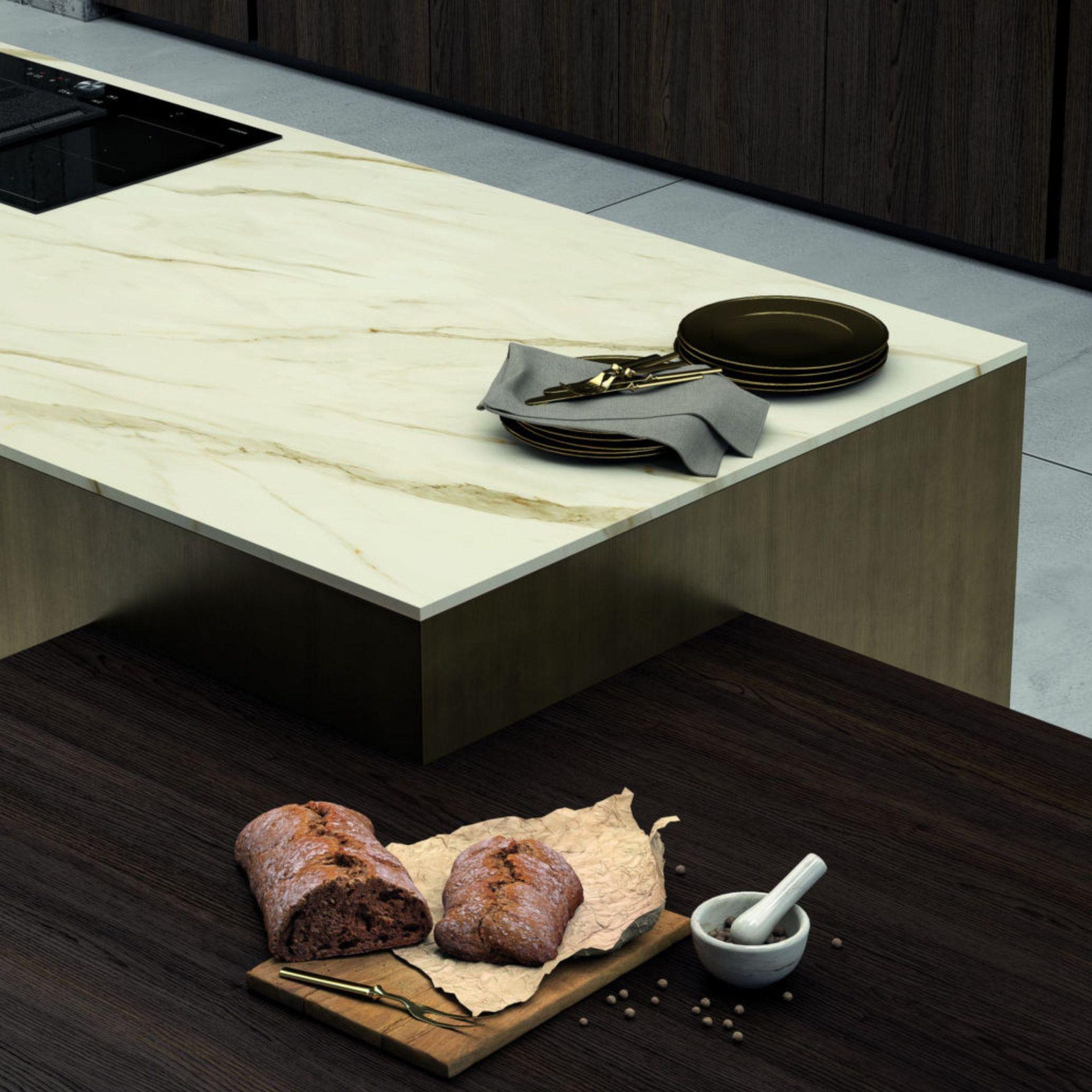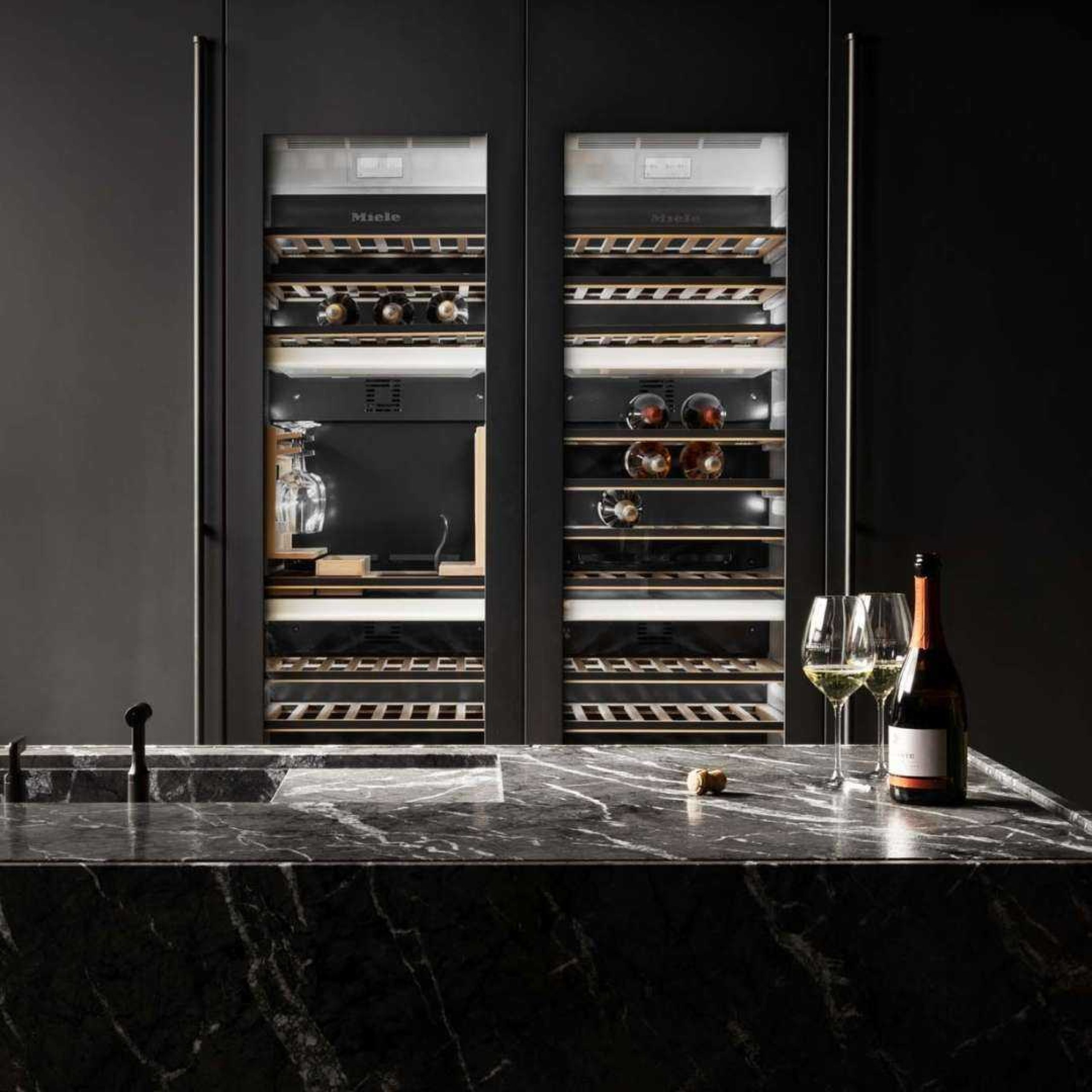December,2023
Kitchen worktop: natural stones or synthetic materials?

Kitchen worktop: natural stones or synthetic materials?
Choosing the kitchen top is a very important, almost fundamental, step for the design of the entire space. This applies to both the functional and aesthetic sides. And when choosing you may have to decide between natural stones or synthetic materials.
In fact, these two categories, despite the many options available, are the main dominators of the sector. Each offers unique advantages that must be taken into consideration when choosing, as much as you need to consider your needs and preferences.
You are about to read the advantages of the main natural stones and the main synthetic materials as kitchen worktop products. Because the only right choice is the one made with competence and we want to help you choose between the best natural stone or synthetic material kitchen top!
What are the best natural stones for kitchen worktops?
When it comes to choosing a natural stone for your kitchen countertop, there are several options you should consider, each with their own characteristics. In general, natural materials are particularly appreciated for their timeless beauty and exceptional resistance.
However, here is an overview of the best natural stones commonly used in kitchen worktops:
Granite
Granite is one of the most popular choices for kitchen countertops. This natural stone offers a wide variety of colors and grains capable of adding a touch of elegance to any kitchen. Granite's resistance to scratches, heat and stains makes it an ideal choice for a challenging environment, perhaps because it is full of children or pets.
Additionally, the lifespan of granite is virtually unlimited if it is cared for properly. However, it is important to note that granite can be expensive and requires periodic sealing to prevent staining.
Quartzite
Quartzite is a natural stone similar to marble, but with greater resistance and superior durability. Less porous than marble, quartzite resists stains better. It is available in a range of colors and grains, allowing you to personalize your kitchen space.
Its heat and scratch resistance makes quartzite a reliable choice for a kitchen countertop. However, quartzite costs can vary greatly depending on the type you choose.
Marble
Marble is particularly known for its elegance and refinement. This natural stone offers a classic look with unique color variations. It is heat resistant, a feature that makes it ideal for preparing lunches, dinners and aperitifs.
However, it is worth considering that marble is porous and can stain easily if not sealed regularly. It is also sensitive to acids, which can cause extensive damage. Choosing marble as a kitchen countertop requires a little more maintenance, but the end result is often stunning.
Porphyry
Porphyry is a volcanic stone with a crystalline structure.
It is known for its extreme hardness and resistance. In fact, this stone resists wear and requires little maintenance, making it an excellent option for kitchen worktops. Its versatility makes it suitable for various applications, including kitchen worktops.
However, porphyry may not be readily available and costs may vary depending on the origin.
As you have understood by now, each natural stone has its own peculiar characteristics. Before making a decision, carefully consider your needs, budget and aesthetic preferences. With the right natural stone, your kitchen countertop will become the focal center of your kitchen, combining functionality and beauty in an exceptional way.
Advantages and disadvantages of granites for kitchen worktops
Among the advantages of granite for kitchen worktops we find:
Aesthetics, because granite offers natural beauty with a variety of colors and veins.
Durability, because it is highly resistant to scratches, heat and stains.
Durability, because a granite countertop can last for many generations if cared for properly.
Among the disadvantages of granite for kitchen worktops, however, we find:
Cost, because granite is often one of the most expensive options.
Maintenance, because it requires periodic sealing to avoid stains.
Weight, it is still helpful to know that granite is heavy and may require additional structural support.
Advantages and disadvantages of marble for kitchen worktops
Among the advantages of a marble kitchen top are:
Beauty, because marble offers a classic and timeless beauty with unique color variations.
Heat resistance, in fact marble is heat resistant, which makes it ideal for cooking.
Among the disadvantages of a marble kitchen top, however, there are:
Porosity, a characteristic that cannot be underestimated. In fact, marble is porous and can stain easily if not sealed regularly.
Sensitivity to acids, another characteristic to always take into consideration. In fact, acids can damage marble.
Advantages and disadvantages of porphyry for kitchen worktops
Finally, porphyry is a volcanic stone with a crystalline structure.
Among the advantages of a porphyry kitchen worktop are:
Resistance, because porphyry is extremely hard and resistant to wear.
Versatility, porphyry is in fact well suited to various applications, including kitchen worktops.
Low maintenance, particularly appreciated is the fact that the porphyry kitchen top requires little maintenance thanks to its resistance.
Among the disadvantages of a porphyry kitchen top, however, there are:
Limited availability, because porphyry may not be easily available everywhere.
Cost, in fact the cost of porphyry can vary based on the origin.
What are the best synthetic materials for kitchen worktops?
Here is an overview of the most common synthetic materials used in kitchen worktops:
Stoneware
Stoneware is a ceramic material. Its resistance to heat, scratches and stains makes it ideal for a demanding culinary environment. Additionally, stoneware is available in a wide range of colors and finishes, allowing you to personalize your kitchen space. The durability of stoneware means having a kitchen top that requires little maintenance over time. However, it is important to note that stoneware is heavy and may require adequate support structure. Also, if hit hard, the stoneware may chip or break.
Synthetic Quartz
Synthetic quartz is a blend of natural quartz and resin, offering a combination of beauty and durability. This material is available in a wide range of colors and finishes, allowing you to choose a kitchen countertop that fits your style perfectly. Synthetic quartz is highly resistant to scratches, stains and heat. Furthermore, being non-porous, it is hygienic and resists germs and stains. However, the cost of synthetic quartz is generally higher than other synthetic materials, but its durability can justify the investment.
Dekton
Dekton is an innovative synthetic material made from a mixture of materials such as glass, porcelain and quartz. This material is known for its extreme resistance to scratches, heat, stains and UV rays. It is an ideal choice for a kitchen countertop that must withstand daily challenges. Furthermore, Dekton offers a wide range of colors and finishes.
Although Dekton is often considered a high-end option, its durability and strength make it a worthwhile investment for many kitchen owners.
The choice between natural stone and synthetic materials for the kitchen countertop is a personal decision that depends on your needs, aesthetic preferences and budget.
Synthetic materials offer a wide range of modern, durable options, while maintenance is often easier than natural stone. With the right selection, your kitchen countertop will be both functional and eye-catching, helping to create the culinary space of your dreams.
How to choose the kitchen top best suited to your needs
Choosing the kitchen worktop is a crucial step in designing your ideal solution. This element will be a central part of your culinary space, both functionally and aesthetically. Before making a decision, it is essential to carefully consider your needs, preferences and budget.
Here are some guidelines to help you choose the kitchen top best suited to your needs:
Style and design
Start by considering the overall aesthetic of your kitchen and home. The kitchen countertop must integrate harmoniously with the overall design of the space.
Natural stones, for example, offer a classic, elegant look with unique grains, while synthetic materials provide a wider range of colors and customizable finishes. Think about your personal style and kitchen design, making sure the countertop you choose fits perfectly.
Strength and durability
Consider how you intend to use your kitchen countertop. If you are an avid cook and plan to use hot pots and pans frequently, look for heat-resistant materials such as granite, synthetic quartz or dekton.
For those who have children at home or expect heavy use of the kitchen, scratch- and stain-resistant materials such as stoneware or synthetic quartz may be the best choice.
Maintenance
Think about the amount of time and effort you are willing to dedicate to maintaining your kitchen countertop. Natural stones like granite or marble require periodic sealing to prevent stains and damage. In contrast, synthetic materials such as synthetic quartz or dekton are less porous and require less maintenance. Keep in mind that proper maintenance will prolong the life of your top and keep it looking flawless over time.
Budget
Set a realistic budget for your kitchen countertop. Natural stones such as granite and marble tend to be more expensive, while synthetic materials such as stoneware, synthetic quartz and Dekton often offer a cheaper alternative. However, the cost can vary greatly based on the specific type of material and where it comes from. Set a budget that reflects your financial possibilities, but keep in mind that investing in a quality countertop can increase the value of your kitchen and your home as a whole.
Hygiene and safety
If you have children at home or are particularly hygiene-conscious, consider the resistance to bacteria and impacts of the chosen material. Synthetic materials like synthetic quartz and Dekton are non-porous and germ-resistant, making them a hygienic choice. Also, if you're concerned about safety, make sure the material is impact-resistant to avoid accidental breakage.
Finally, always remember that you can ask for advice from real kitchen top experts, indicating all your needs and letting them advise you on the perfect solution for you.
